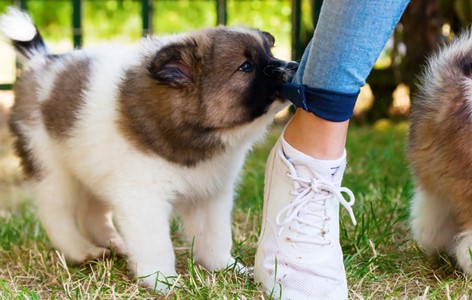Almost all dogs bark. Some bark a lot, others hardly bark at all. So why do dogs bark and what can you do if your dog barks excessively?
Why do dogs bark?
Barking is a completely normal behaviour for dogs and one way they communicate with us and those around them. Dogs can bark for different reasons and this means that not all barks mean the same thing.
Here are some of the most common reasons why dogs bark:
1.Territorial behaviour
Dogs often bark when people knock on the door or walk past their home (their territory). This is an instinctual behaviour to warn the other family members of a potential threat.
2. Attention-seeking behaviour
Some dogs learn that barking results in a desired outcome such as attention, being let inside or outside or having a ball thrown. The behaviour is then repeated in an attempt to achieve a desired outcome.
3. Separation anxiety
Dogs who experience anxiety when separated from their owner or family often bark, whine and howl for long periods of time when home alone. Their barking is a symptom of their underlying anxiety.
4. Boredom – When dogs are bored they may entertain themselves by giving themselves a job to do. This can involve barking at birds, noises or in response to hearing other dogs bark in the neighbourhood.
When is barking considered “excessive”
Barking is a normal behaviour and most dogs bark from time to time. However barking can become excessive when it occurs frequently during the day and for long periods of time. Nuisance barking complaints are the most common complaints local councils in Australia receive from their residents. Formal complaints can result in dog owners having to take action to reduce the barking.
How to reduce Excessive Barking
Successfully reducing excessive barking involves identifying and addressing the cause of the barking. For example, a dog that’s barking all day due to separation anxiety will need a different approach to reducing excessive barking compared to a dog who is barking due to territorial behaviour.
Let’s look at the most common reasons dogs bark excessively and the best way to reduce barking for each one:
1.Territorial behaviour
You can help reduce territorial barking by blocking visual access to people walking past, such as holes in fences and gates.
Opaque window film can also be very effective at blocking a dog’s view of people and other dogs walking past.
At the same time, you can work to teach your dog that people walking past is a good thing by pairing them with high value treats for calm and compliant behaviour, such as sitting.
2. Attention-seeking behaviour
Teach your dog that barking no longer pays off. Avoid giving your dog anything they desire as a consequence for barking. Instead, completely ignore the barking and give them what they want as a consequence of NOT barking. With repetition and consistency you’ll see their barking reduce.
3. Separation anxiety
Separation anxiety can take time to treat and some dogs benefit from medication in conjunction with behaviour modification to teach them how to cope with separation. If you suspect your dog is experiencing separation anxiety, speak with your vet. Behaviourists and dog behaviour consultants can work with you to address separation anxiety.
4. Boredom
Dogs are highly intelligent and were originally bred to work for us as herders, hunters and guarders. Even though we rarely require dogs to perform these jobs these days, many breeds still retain the instinct and desire to work, especially working dog breeds. Ensure your dog is receiving adequate mental stimulation and physical exercise each day. Daily training sessions utilising positive reinforcement, sniff walks and feeding meals in puzzle toys promote problem solving and help keep dogs occupied. By reducing boredom you reduce the likelihood of barking.
Remember, some barking is normal and all dogs should be allowed to engage in the behaviour.
However when it becomes excessive you can implement these tips to help reduce excessive barking in your dog.
























